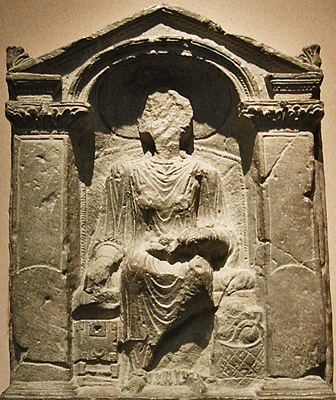
Tombstone 2nd century CE, Britain
full monument
Regina’s tombstone reveals little but suggests much about her life: a native of Britain, she was a slave to the man who freed and married her, dying young and beloved. Her large and richly carved funerary monument was discovered in Arbeia, a Roman fort and settlement that was originally built about 129 CE, during the reign of Hadrian, in the upper corner of the province of Britannia, the most northwestern part of the Roman Empire (map). Regina’s epitaph reveals that she was born into the tribe of the Catuvellauni, who held the largest tribal area in southern Britain and had their capital at Verulamium. How she became enslaved is unclear, as tribal revolts in Britain ended with the failed revolt of Caratacus in 51 CE. She married her former master, who identifies himself as Barates, a native of Palmyra, either a wealthy merchant who had migrated or a mercenary soldier. How her husband came to Arbeia, a fort that protected the seaport and served military units in the north and along Hadrian's Wall, is also unclear. Regina's tombstone is evidence of the improbable meeting and acculturation of two people from provinces of the Empire that were furthest apart, Britannia and Syria; they are but one example of the multi-cultural contacts and relationships that Rome could and did facilitate. The sculptor portrayed her in the pose and dress of an upper-class Roman matrona, wearing a necklace of large beads and proudly seated on a high-backed wicker throne chair (replica) with spindle and distaff in hand evidencing her position as materfamilias; at her feet are other symbols of her role as diligent manager of the goods of her husband’s domus: a strongbox for valuables and her basket of wool. Set within a niche, Regina's frontal pose and the linear depiction of her garments’ folds are reminiscent of Palmyrene art, although funerary portraits found in Palmyra often depict women covered with jewelry.
It was customary for Palmyrenes to offer bilingual texts (Greek or Latin) on funerary monuments. The final line of Regina's epitaph is Barates' personal lament in Palmyrene: Regina, freedwoman of Barate, alas.
Click on the underlined words for translation aids and commentary, which will appear in a small window.